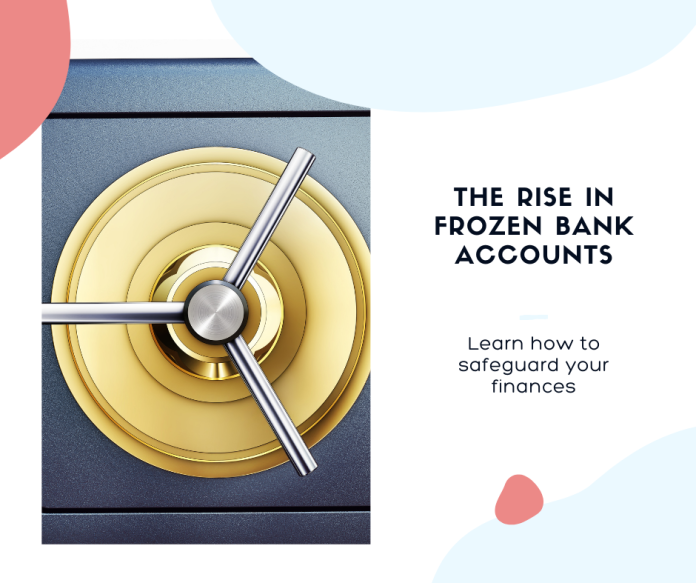The value of fraud committed in the UK more than doubled to £2.3bn in 2023, which is the second-biggest year for scams in the last two decades*
*BDO’s latest FraudTrack report highlighted the number of reported cases rose by 18% to a three-year high.
The rise in fraud correlates with an unsettling trend of frozen bank accounts. There has been much press coverage about this, even high profile politicians such as Nigel Farage has been affected by this growing phenomenon.
Imagine waking up one morning, trying to make a routine purchase or pay a bill, only to find out that your bank account has been frozen, leaving you stranded and perplexed. Unfortunately, this scenario is becoming increasingly common, prompting individuals to reevaluate their financial security measures. Suits Me the growing UK based Fintech, share their advice into the reasons behind this surge and explore actionable steps to protect your finances from such disruptions.
Understanding the Rise
The rise in frozen bank accounts can be attributed to several factors, primarily stemming from regulatory compliance requirements and increased security protocols implemented financial organisations Here are some key reasons behind the phenomenon:
- Compliance Requirements: Banks and FinTech’s are subject to stringent regulatory frameworks designed to combat money laundering, fraud, and terrorism financing. In an effort to adhere to these regulations, financial institutions are increasingly scrutinizing customer accounts and transactions. Any suspicious activity, whether intentional or unintentional, may trigger an account freeze until further investigation is conducted.
- Identity Verification Issues: With the rise of identity theft and account takeover scams, the industry is becoming more vigilant about verifying the identity of their customers. If there are discrepancies or inconsistencies in the information provided, banks and alternatives may opt to freeze the account to prevent unauthorized access and protect the customer’s funds.
- Fraudulent Activities: Cybercriminals are constantly devising more sophisticated methods to defraud individuals and financial institutions. Accounts may be frozen if they are suspected to be involved in fraudulent activities, such as unauthorized transactions, phishing schemes, or money mule operations.
- Legal Actions: In some cases, creditors or government agencies may seek legal recourse to recover debts or unpaid taxes. As part of the legal process, bank accounts associated with the debtor may be frozen until the matter is resolved through negotiations or court proceedings.
What You Can Do to Avoid It
While the prospect of a frozen bank account may seem daunting, there are proactive measures you can take to minimize the risk and safeguard your finances:
- Keep Your Information Updated: Ensure that your bank or online account provider has accurate and up-to-date information, including your contact details and identification documents. Any discrepancies or outdated information could raise red flags and trigger account freezes.
- Monitor Your Accounts Regularly: Stay vigilant by regularly monitoring your bank accounts for any unusual activity or transactions. Most accounts, including Suits Me provide automated notifications on deposits and withdrawals, account logins from unfamiliar devices, or suspicious transactions.
- Be Transparent with Your Bank: If you anticipate any changes in your spending behaviour or payments into your account, such as large transactions or international transfers, it’s key you inform your bank in advance. Providing transparency about your financial activities can help prevent a ‘false positive’ account freezes.
- Exercise Caution Online: Be cautious when sharing personal or financial information online and beware of phishing attempts or fraudulent schemes. Avoid clicking on suspicious links or responding to unsolicited requests for sensitive information.
- Diversify Your Banking Relationships: Consider diversifying your banking relationships across multiple institutions. This not only spreads your risk but also provides backup options in case one account gets frozen. Many of Suits Me customers use our accounts as a secondary account to compliment their mainstream bank account.
- Seek Legal Advice if Necessary: If your account has been frozen due to legal actions or debt collection efforts, seek legal advice to understand your rights and explore potential remedies or negotiation strategies.
While the rise in frozen bank accounts may be concerning, it’s essential to stay informed and proactive in managing your finances. By understanding the reasons behind account freezes and being diligent, you can mitigate the risk of such disruptions and protect your hard-earned money. Remember, vigilance and transparency are key to maintaining financial security in an increasingly complex banking landscape.



 Bitcoin
Bitcoin  Ethereum
Ethereum  XRP
XRP  Tether
Tether  Solana
Solana  USDC
USDC  TRON
TRON  Lido Staked Ether
Lido Staked Ether  Cardano
Cardano  Avalanche
Avalanche  Toncoin
Toncoin